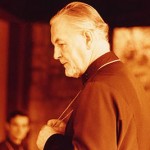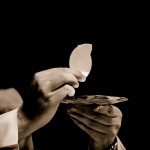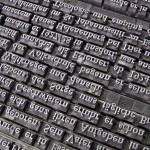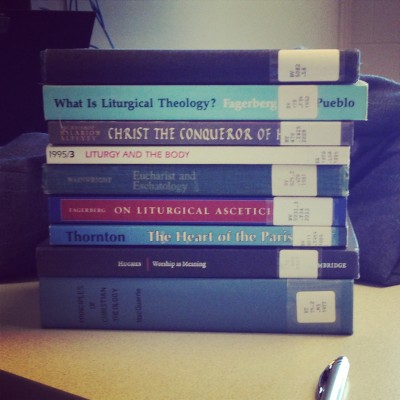A troubling (to me) blog post has been going around over the last few weeks regarding the Reformation and the Eucharist. Dr. Kelly Pigott, a blogger on the Patheos Progressive Christian channel, has argued that the meal Jesus instituted in Jerusalem with his disciples some 2,000 years ago has been distorted and misappropriated through centuries of infighting and disagreement. Ultimately, Pigott argues that Communion is more about the transformation of the partaker into Jesus than anything else. He suggests that the “eternal question one must ask of Communion is…what happens to me?’
For the sake of clarity, you can and should read the original post here before continuing below.
Unfortunately, I believe Pigott’s post to have been historically inaccurate at best and full of mischaracterizations at worst; or perhaps vice versa. The Reformers, and I’m not only talking about Anglicans, would agree that the Communion was about grace, that this was not about being part of the “spiritual-elite”, and that those partaking are somehow affected deeply. More importantly, the Early Church witness agrees with these statements as well. The real issue at hand here is Pigott’s decision to focus the Eucharist on the individual rather than the on Jesus.
Some of the comments have suggested that focusing on the bread and wine is akin to answering the question about how many angels can fit on the head of a needle. This is utter nonsense! One does not have to chose between two extremes—those of self-focus or elemental transformation—in order to have a meaningful and orthodox conversation about the Eucharist. Embracing mystery does not punt the proverbial ball down the field nor does it ignore the question of presence, it simply seeks to assert that Christ is in fact present without feeling the need to define his presence concretely.
As an example, the Eucharistic prayers from the 1549 and 1552 Books of Common Prayer both include the Prayer of Humble Access. I have included the prayer below and the reader should note two things: first, I have updated the old English, and second, the parentheses denote lines removed between the two editions:
We do not presume to come to this thy table (o merciful lord) trusting in our own righteousness, but in thy manifold and great mercies: we be not worthy so much as to gather up the crumbs under thy table: but thou art the same Lord whose property is always to have mercy: Grant us therefore (gracious Lord) so to eat the flesh of thy dear son Jesus Christ, and to drink his blood (in these holy Mysteries), that we may continually dwell in him, and he in us, that our sinful bodies may be made clean by his body, and our souls washed through his most precious blood. Amen.[1]
Honestly I feel as I though I can end my post here without comment based on the thick theological language of this prayer. But for the sake of clarity, and because I’m passionate about this, I will go on. I have italicized some pertinent statements in the prayer to unpack below.
First, the entire prayer is grounded in the belief that no one can earn or merit access to the Lord’s Table. This is not the result of being part of the spirituality elite but is instead based solely in the work of Christ. This belief was not new to Christianity when Archbishop Cranmer wrote this prayer in the 1540’s; the Early Church also believed that to eat and drink at the eschatological banquet table was a gift of the highest kind.
Second, the humility embodied in the prayer is given further credibility by the grace of God. It is God’s property (or nature) to always have mercy and therefore although we are unworthy to partake we are still invited. Again, nothing spiritually elite here.
Third, Communion with God is bedrock to this prayer, to the Reformation, and to the Early Church. Read Schmemann, Ziziuolas, Pope Benedict XVI, and the Eucharistic theologies of the Early Church and you will find example after example of people believing that Communion is union with God. John Calvin did not come up with this idea on his own, he simply recovered it and insisted upon it.
Fourth, it was the belief of Cranmer, Hooker, and many of the Anglican reformers and divines that the Eucharist did indeed effect some type of change in the believer. The Prayer of Humble Access makes clear that the cleansing of the body and the washing of the soul was part of the sacrament. However, this was not the purpose behind the sacrament’s institution nor was it the ultimate goal of individual. The early church fathers and the reformers all believed that Communion was nourishment and healing for the soul, a gift from God that transformed those partaking, but the focus was always on Christ’s once and perfect oblation, and the triune Godhead, rather than on the self.
In the Eucharist the Church is at the summit of her worship, in the throne room of Almighty God, and the concept of the self could not be further from the equation. The moment we begin focusing on ourselves and what we “get” out of worship, or what “happens” to us is the moment we have misunderstood the Eucharist entirely.
Sure, Church history is fraught with examples of fighting and arguments over Eucharistic theology. Indeed there are numerous denominations within the Church that have differing views on what takes place in the sacrament of the kingdom. That being said, the answer to this conundrum, to finding common Eucharistic ground in the catholic church is not to be sought inward but upward, heavenward.
In view of God’s absolute otherness, his holiness, we are not worthy to approach his table. But God has approached us in the form of Jesus his Son, the second person of the Trinity, who has prepared a place for us at the wedding feast. Accepting the grace-filled invitation of a loving and merciful God is neither arrogant nor elite, it is worship. It is worship the way God intended it to be and our charge is to draw others into worship as we extend to them the Body and Blood of our Lord.
[1] Brian Cummings, The Book of Common Prayer: The Texts of 1549, 1559, and 1662, 261.













